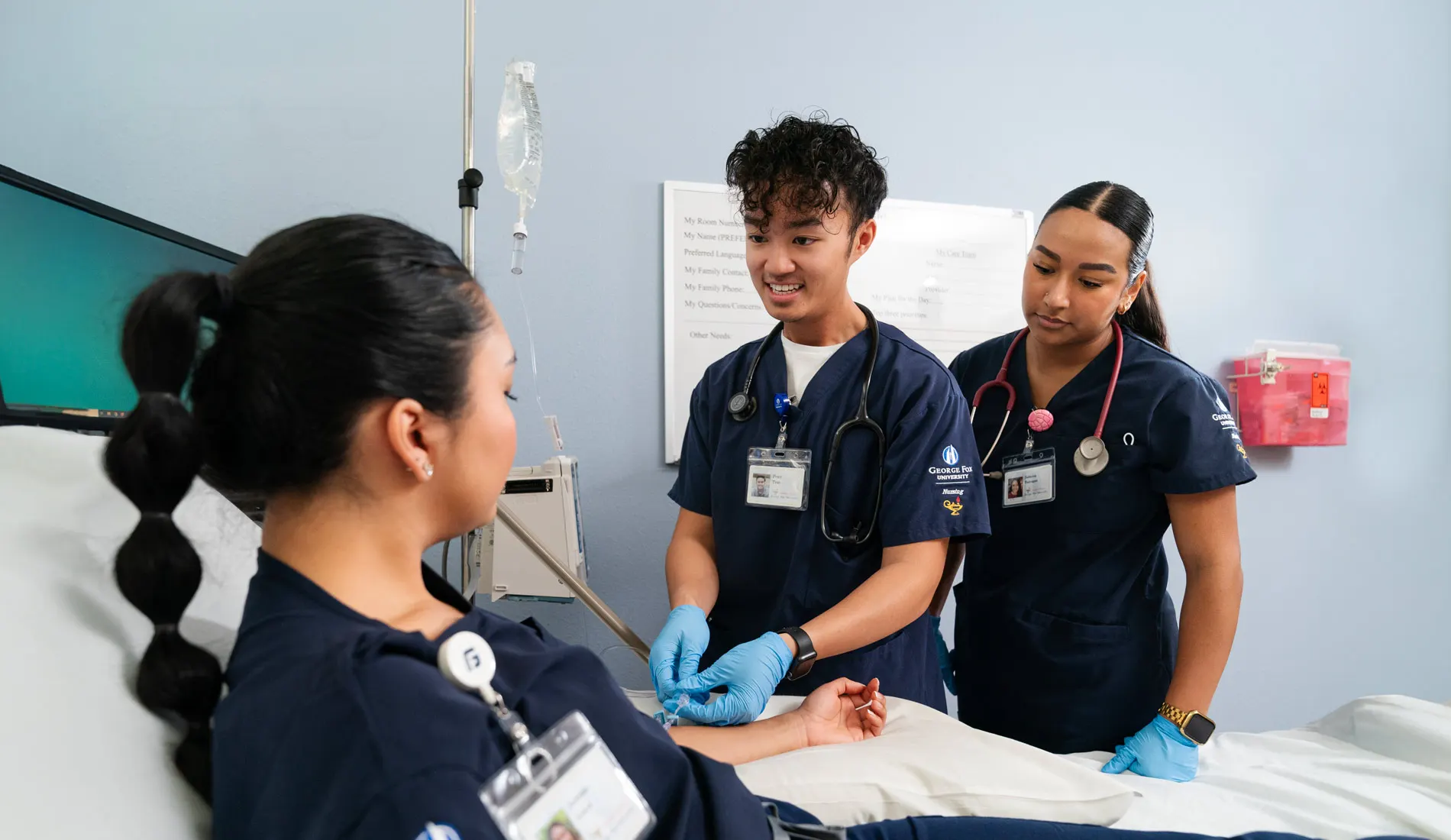At A Glance
Program Type
Bachelor of Science in Nursing (BSN)
Accreditation
Northwest Commission on Colleges and Universities (NWCCU), Commission on Collegiate Nursing Education (CCNE)
Recognition
U.S. News and World Report “Best Undergraduate” nursing program
Opportunities
Six unique clinical experiences with 800 to 1,000 clinical hours
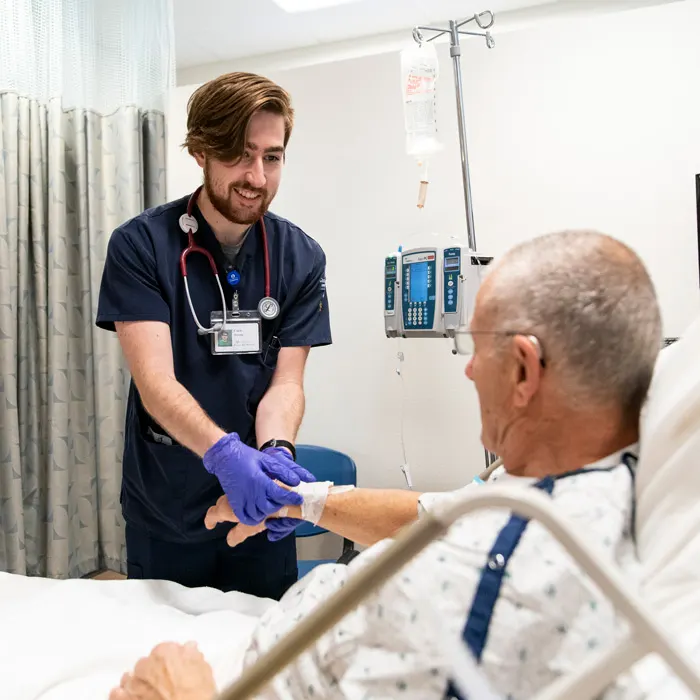
If there was ever a time we needed nurses who were compassionate, resilient and showed grit and determination under duress, it’s today. The aging of our population, the increasing threat of disease, and the strain put on our hospitals and frontline workers due to the recent pandemic are just three reasons they are needed now more than ever.
You can be the one who steps up and answers the call.
CCNE Accreditation
The baccalaureate degree program in nursing at George Fox University is accredited by the Commission on Collegiate Nursing Education (https://ccneaccreditation.org).
The baccalaureate program is also approved by the Oregon State Board of Nursing (OSBN). Upon completion of the nursing program, you will be prepared to take the NCLEX-RN licensure exam and enter into nursing practice.
NCLEX first-time pass rate (3-year average)
Our Goal: Develop Compassionate Caregivers
A nursing education at George Fox strikes a balance between caring for others and sound scientific knowledge. Beyond book smarts and clinical training, we place a high priority on developing compassionate caregivers who see patients not as numbers, but as people.
Here, you will gain a quality nursing education in order to improve the health and well-being of individuals, families and populations. You will be trained to make a difference. To offer hope and healing to the world.
Where to Serve? Options Abound
Our graduates go on to work in hospitals, research facilities, community-based clinics, doctors’ offices and in missions roles overseas. They are also equipped to pursue graduate education and fulfill the need for nurses in advanced practice, higher education and management.
Doctor of Nursing Practice
George Fox launched a Nurse Anesthesia DNP program in 2025. Graduates will become CRNA leaders in providing care to underserved populations, a critical need throughout the state. The move continues to bring George Fox students deep expertise in the medical sciences.
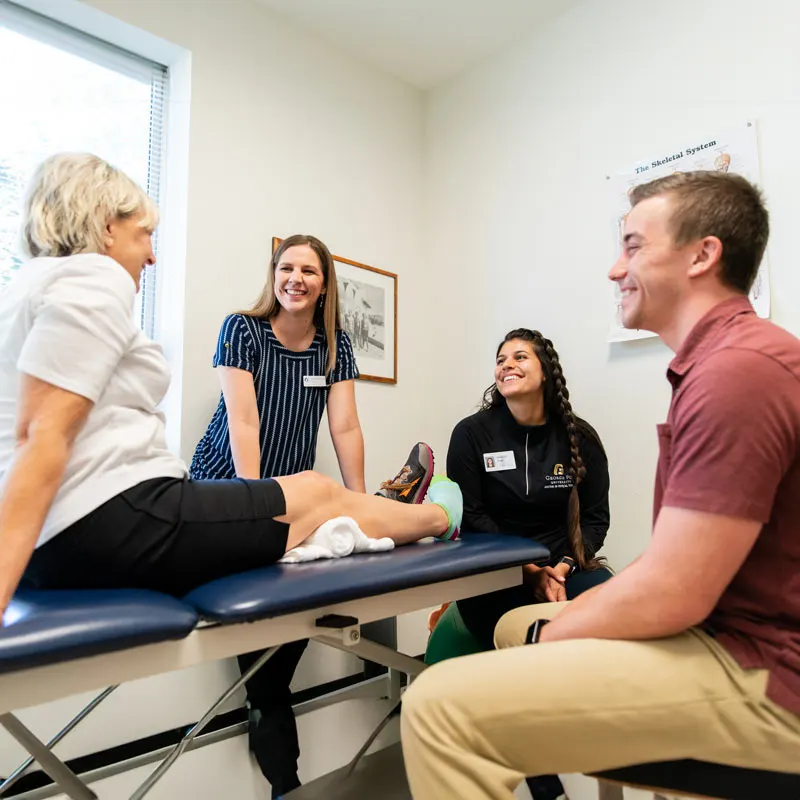
Interprofessional Education
The Interprofessional education program happens twice a year—once each semester—giving you the chance to gain valuable, hands-on experience. By participating, you’ll see how different professional training and ethics influence client care, preparing you to collaborate with a variety of professionals in the health system. You’ll build confidence in sharing your perspectives and assessments while learning from other disciplines, setting you up for success in real-world professional environments.
Program Distinctives Why Study Nursing at George Fox?
-
Christ-centered approach: Compassion and whole-person care are integrated into every course.
-
Small cohort model: Faculty know you and support your success personally.
-
Extensive clinical experience: At least 800 hours in hospitals, clinics, home health and hospice, local schools, and correctional facilities.
-
You’re not alone: You’ll receive nursing peer mentoring as part of a collaborative cohort community.
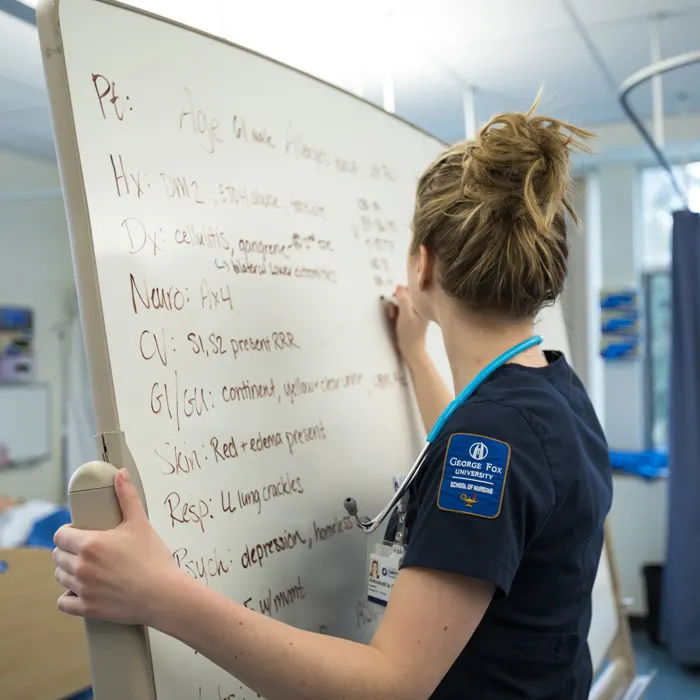
Courses / Curriculum What Will I Study?
- Health Assessment
- Clinical Judgment
- Pharmacologic and Nonpharmacologic Treatments
- Population Health
- Person-centered Care
- Interprofessional Partnerships
- Therapeutic Communication
- Maternal Child Care
- Adult Health
- Ethical and Legal Nursing Practice
- Nursing Leadership
- Quality and Safety in Nursing
Applying to the Nursing Program
In addition to applying to George Fox, nursing students also apply for admission to the nursing program.
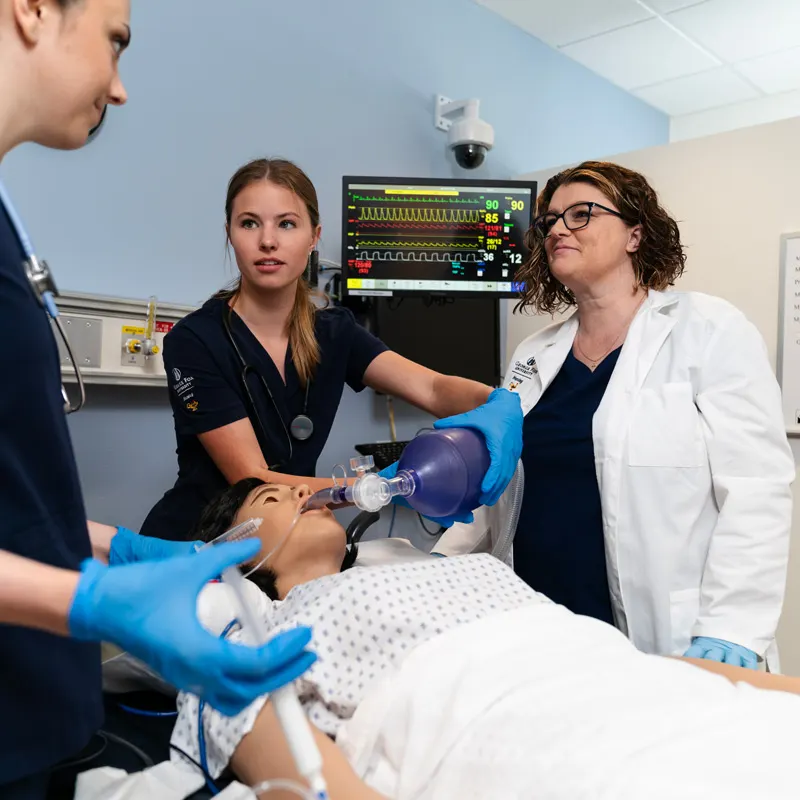
Our spaces/Where Will I Learn?
Simulation Lab
Our simulation lab in the Roberts Center is a state-of-the-art facility that allows you to experience real-world healthcare scenarios with professor guidance. The space includes a Skills Lab, a Home Health Room and a simulation center, each of which offers a unique opportunity to engage in healthcare practices.
The simulation lab uses mannequins that simulate breathing, crying and bleeding. We also employ actors as patients to provide students experience responding to real people in need of a wide range of healthcare treatments, including home visits and telehealth appointments.
Career Outlook What’s After George Fox
Registered nurses (RNs) constitute the largest healthcare occupation in the U.S., with 2.6 million jobs. Registered nurses have the opportunity to work in a variety of clinical and non-clinical settings, including hospitals, ambulatory care clinics, nursing homes, community settings and academic institutions.
The Bureau of Labor Statistics estimates that employment of registered nurses is projected to grow 6% from 2022 to 2032, adding a projected 177,400 jobs in the U.S. over this period.
In Oregon, projections show that, between 2022 and 2032, the state will see a 16.8% growth in healthcare occupations, including a whopping 52.6% growth rate in the nurse practitioner field (Oregon Employment Department, 2023).
- Surgical Unit, Seattle Children’s Hospital
- Pediatrics, Loma Linda Medical Center
- Surgery, Silverton Hospital
- Oncology, Midland Memorial
- Adult Medical/Surgical, OHSU
- Labor and Delivery, Evergreen Hospital
- NICU, UCLA Medical Center
- MD Anderson Cancer Center
- Family Birth Center, Legacy Emanuel
- Bone Marrow Transplant Unit, OHSU
- ER, Salem Hospital
- Labor & Delivery, Silverton Hospital
- Medical/Surgical, Pali Momi Medical Center
- Orthopedics, Salem Hospital
- Pediatrics, Kadlec Regional Medical Center
- Medical/Surgical, Providence Newberg
- OHSU (DNP)
- Gonzaga (MSN)
- University of St Mary (MSN)
- Idaho State University (DNP-FNP)
- University of Portland (DNP-FNP)
- Westminster College (Nurse Anesthesia)

From Cancer Patient to Oncology Nurse
When Peter Tran was a cancer patient at Randall Children’s Hospital, he dreamed of one day returning to help kids just like him in their own battle with cancer. Today, the recent nursing graduate is doing just that.
“I remember when they would tell us, ‘You're gonna achieve great things here at Fox, and you're gonna be able to serve your community.’ I was like, ‘How could I even do that?’ I'd really like to go back to Randall's or Doernbecher, but Randall's was where I was treated.”

Savannah Hamilton
RN, Providence Portland Medical Center
I have come a long way from being intimidated by walking into a patient's room. Now every time I enter a room with confidence, I think back and am grateful to my nursing instructors' wisdom, encouragement and investment in my training. While growing in professionalism, the professors and faculty at George Fox have also deepened my empathy for others, cultural humility, curiosity for learning, and interprofessional collaboration with friends and colleagues. I could not be more grateful for the way this community and the Lord has shaped me into the person I am becoming!
Chat with a current student
Hobbies & Interests: #Hiking, reading, Being outdoors, hanging out with friends and watersports
About Me: Hi my name is Jillian and for my future career I hope to become a nurse. I am from Salem, Oregon and have lived there my whole life. I am currently...Read more
Ask Me About: Adventures in the PNW
“What’s your favorite class?”
“What’s the best student event?”
Request Information About Nursing
